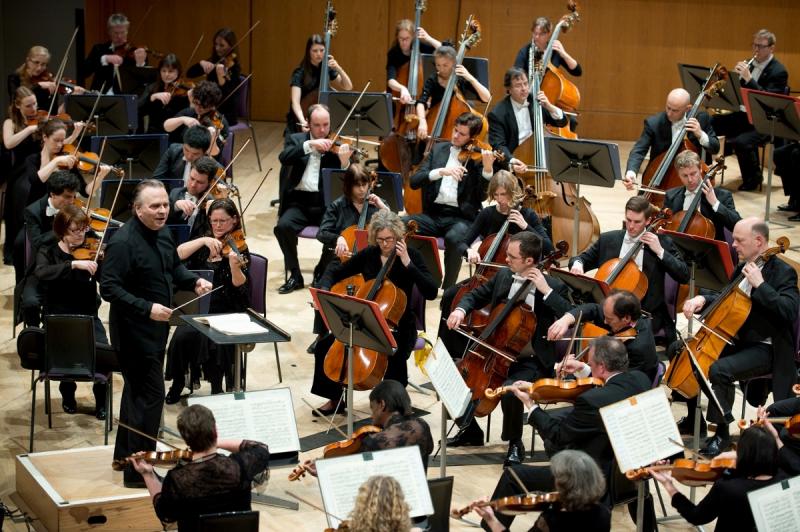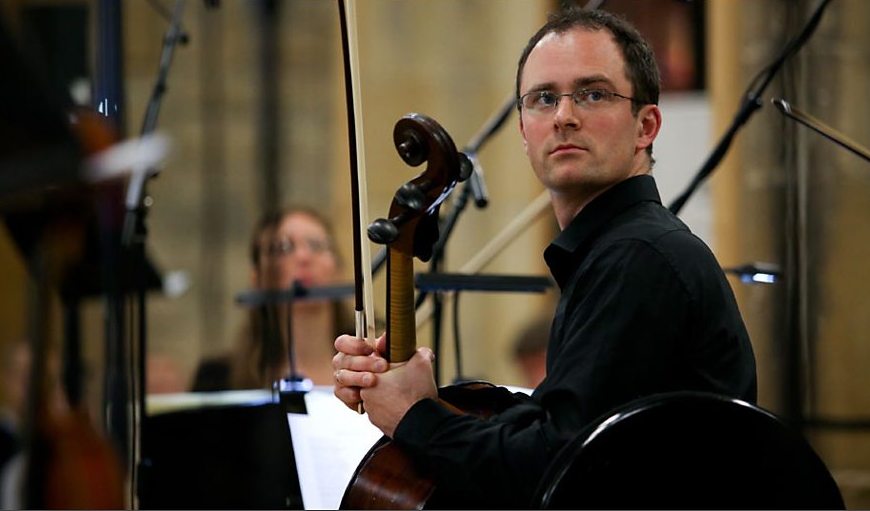Hallé, Elder, Bridgewater Hall, Manchester review – pictorial, dramatic power | reviews, news & interviews
Hallé, Elder, Bridgewater Hall, Manchester review – pictorial, dramatic power
Hallé, Elder, Bridgewater Hall, Manchester review – pictorial, dramatic power
Mancunian players excel on home ground in Elgar and Strauss

Sir Mark Elder’s first concert in the Hallé Thursday series for 2018-19 was on clearly mapped Hallé territory – Richard Strauss and Elgar. They have a reputation, and a tradition, of playing these composers’ music very well.
The soloists were their own principals, cellist Nicholas Trygstad (pictured below) and viola player Timothy Pooley. Though it won’t be discernible in any purely audio document of the occasion, they and their colleagues sharing the characters of the doleful knight and his squire, wore colour-coded shirts for easy identification by the audience. There was a surtitle screen, too, to help us keep abreast of events in the story as depicted in Strauss’s introduction and variations.
That was good music education, but in many ways the pictorial and dramatic power coming over in purely musical terms was enough to lead us through. Elder revels in the orchestral sound effects supplied generously in this score (sheep bleating via flutter-tongued brass instruments, pizzicato water droplets, a wind machine and so on), and even more so in the delicacy of the hero’s lucid interludes and the sweetness of his romantic dreams.  From near the beginning, as Stéphane Rancourt’s oboe solo was heard against the purest whispered tone from back-desk violins, the fantasy world of Cervantes’ tale was subtly created, and the textures accompanying the protagonists’ musical representatives were gloriously clear. There was a brief moment of slight intonational uncertainty, but the orchestral brass were in magnificent fettle. Variations Three and Five were also outstanding for richness of tone in all departments, mellow brass included, with lovely string playing under soloist-leader Lyn Fletcher and perfectly blended woodwind chords, and the battle scene was virtuosically played. Trygstad and Pooley shone in their solo roles, showing both technical mastery and expressive power.
From near the beginning, as Stéphane Rancourt’s oboe solo was heard against the purest whispered tone from back-desk violins, the fantasy world of Cervantes’ tale was subtly created, and the textures accompanying the protagonists’ musical representatives were gloriously clear. There was a brief moment of slight intonational uncertainty, but the orchestral brass were in magnificent fettle. Variations Three and Five were also outstanding for richness of tone in all departments, mellow brass included, with lovely string playing under soloist-leader Lyn Fletcher and perfectly blended woodwind chords, and the battle scene was virtuosically played. Trygstad and Pooley shone in their solo roles, showing both technical mastery and expressive power.
In Elder's hands, Elgar's Second Symphony begins where the First left off, with the tread of a thousand marching feet. The vigour and strength of its opening, with the pace of the main theme slightly broadening at its return, was deeply impressive, and there was gloriously ethereal string playing in the middle of the movement and a loving caress at the beginning of the music’s reprise. In many ways the Larghetto second movement was the emotional core of the performance, its rapt feeling casting a spell over the hall, its structure building to a peak of intensity, and its final fade-out mesmerizing.
The third movement – a Rondo in form but a scherzo in function – revealed a multi-faceted quality: nostalgic and doom-laden, exuberant and grim. There’s a real window into Elgar’s complex psychology here, and Elder does not miss a whit of it. And the intoxicating main theme of the finale had just enough of a swing to make it beguiling as well as noble and positive. Its rhythmic qualities were emphasized as the movement continued, to build to a climax of surging waves of melody propelled by stirrings of volcanic emotion, with a benediction in the final, long-sustained chord.
The future of Arts Journalism
You can stop theartsdesk.com closing!
We urgently need financing to survive. Our fundraising drive has thus far raised £49,000 but we need to reach £100,000 or we will be forced to close. Please contribute here: https://gofund.me/c3f6033d
And if you can forward this information to anyone who might assist, we’d be grateful.

Subscribe to theartsdesk.com
Thank you for continuing to read our work on theartsdesk.com. For unlimited access to every article in its entirety, including our archive of more than 15,000 pieces, we're asking for £5 per month or £40 per year. We feel it's a very good deal, and hope you do too.
To take a subscription now simply click here.
And if you're looking for that extra gift for a friend or family member, why not treat them to a theartsdesk.com gift subscription?
more Classical music
 Echo Vocal Ensemble, Latto, Union Chapel review - eclectic choral programme garlanded with dance
Beautiful singing at the heart of an imaginative and stylistically varied concert
Echo Vocal Ensemble, Latto, Union Chapel review - eclectic choral programme garlanded with dance
Beautiful singing at the heart of an imaginative and stylistically varied concert
 Scott, Irish Baroque Orchestra, Whelan, RIAM, Dublin review - towards a Mozart masterpiece
Characteristic joy and enlightenment from this team, but a valveless horn brings problems
Scott, Irish Baroque Orchestra, Whelan, RIAM, Dublin review - towards a Mozart masterpiece
Characteristic joy and enlightenment from this team, but a valveless horn brings problems
 Classical CDs: Voice flutes, flugelhorns and froth
Baroque sonatas, English orchestral music and an emotionally-charged vocal recital
Classical CDs: Voice flutes, flugelhorns and froth
Baroque sonatas, English orchestral music and an emotionally-charged vocal recital
 Kanneh-Mason, Britten Sinfonia, Shave, Milton Court - a grin and a big beaming smile
A pair of striking contemporary pieces alongside two old favourites
Kanneh-Mason, Britten Sinfonia, Shave, Milton Court - a grin and a big beaming smile
A pair of striking contemporary pieces alongside two old favourites
 theartsdesk at the New Ross Piano Festival - Finghin Collins’ musical rainbow
From revelatory Bach played with astounding maturity by a 22 year old to four-hand jazz
theartsdesk at the New Ross Piano Festival - Finghin Collins’ musical rainbow
From revelatory Bach played with astounding maturity by a 22 year old to four-hand jazz
 First Person: Manchester Camerata's Head of Artistic Planning Clara Marshall Cawley on questioning the status quo
Five days of free events with all sorts of audiences around Manchester starts tomorrow
First Person: Manchester Camerata's Head of Artistic Planning Clara Marshall Cawley on questioning the status quo
Five days of free events with all sorts of audiences around Manchester starts tomorrow
 Goldscheider, Brother Tree Sound, Kings Place review - music of hope from a young composer
Unusual combination of horn, strings and electronics makes for some intriguing listening
Goldscheider, Brother Tree Sound, Kings Place review - music of hope from a young composer
Unusual combination of horn, strings and electronics makes for some intriguing listening
 theartsdesk Q&A: composer Donghoon Shin on his new concerto for pianist Seong-Jin Cho
Classical music makes its debut at London's K-Music Festival
theartsdesk Q&A: composer Donghoon Shin on his new concerto for pianist Seong-Jin Cho
Classical music makes its debut at London's K-Music Festival
 Helleur-Simcock, Hallé, Wong, Bridgewater Hall, Manchester review - moving lyricism in Elgar’s concerto
Season opener brings lyrical beauty, crisp confidence and a proper Romantic wallow
Helleur-Simcock, Hallé, Wong, Bridgewater Hall, Manchester review - moving lyricism in Elgar’s concerto
Season opener brings lyrical beauty, crisp confidence and a proper Romantic wallow
 Kohout, Spence, Braun, Manchester Camerata, Huth, RNCM, Manchester review - joy, insight, imagination and unanimity
Celebration of the past with stars of the future at the Royal Northern College
Kohout, Spence, Braun, Manchester Camerata, Huth, RNCM, Manchester review - joy, insight, imagination and unanimity
Celebration of the past with stars of the future at the Royal Northern College
